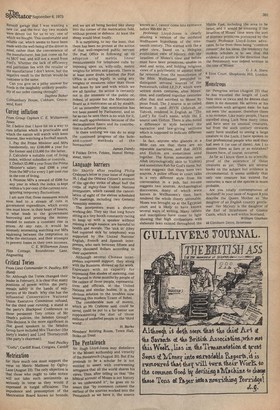The Pentateuch
Sir: Hugh Lloyd-Jones may disbelieve in the 'Mosaic authorship and veracity of the Pentateuch (August 23). But if he pretends to be a scholar he is not entitled to assert with overweening arrogance that all the world shares his views. Thus, after telling us that "the biblical account of Moses is not history as we understand it", he goes on to assert that "by coommon consent the earliest of the sources worked into the Pentateuch as we have it, the source known as J, cannot come into existance before 950-850 BC."
Professor Lloyd-Jones is clearly retailing a version of the outdated Wellhausen hypothesis of the nineteenth century. This started with the a priori view, based on a Helegian evolutionist view of history, that the Israelites of Moses's time and before must have been primitives, unable to read and write, and holdin,g religious views of a polytheistic or animist kind far removed from the monotheism of the Bible. Wellhausen pretended to distinguish serveral sources of the Pentateuch, called J,E,D,P, which were written down centuries after Moses' time, and conflated together centuries after that and ascribed to Moses by pious fraud. The J source is so called because it used JHVH (Jehovah or Yahveh, rendered in English as "The Lord") for God's name, while the E source uses Elohim. There is also noted a difference in style between the narrative and law-giving sections which is supposed to indicate different authors.
In fact, anyone who glances at a Bible can see that there are no separable narratives, and that JHVH and Elohim are sometimes used together. The Koran sometimes uses Allah (etymologically akin to 'Elohim) and sometimes Rab for God's name, but no-one suggests that there were two sources. A police officer in court talks in a very different style from his conversation in a pub, but no-one suggests two sources. Archaeological discoveries, many of which were known in Wellhausen's time, have rendered the whole theory untenable. Moses was brought up at the Egyptian court and is likely to have known several ways of writing. Many tablets and inscriptions have come to light showing that high civilisations with elaborate laws existed throughout the Middle East, including the area to be Israel, and it would be amazing if the Israelites of Moses' time were the sort of illiterate primitives portrayed by the theory Professor Lloyd-Jones advocates. So far from there being "common consent" for his ideas, the tendency for modern scholars is to see that the evidence all points in the direction that the Pentateuch was indeed written in the time of Moses.
G. J. A. Stern 6 Eton Court, Shepherds Hill, London N6


































 Previous page
Previous page